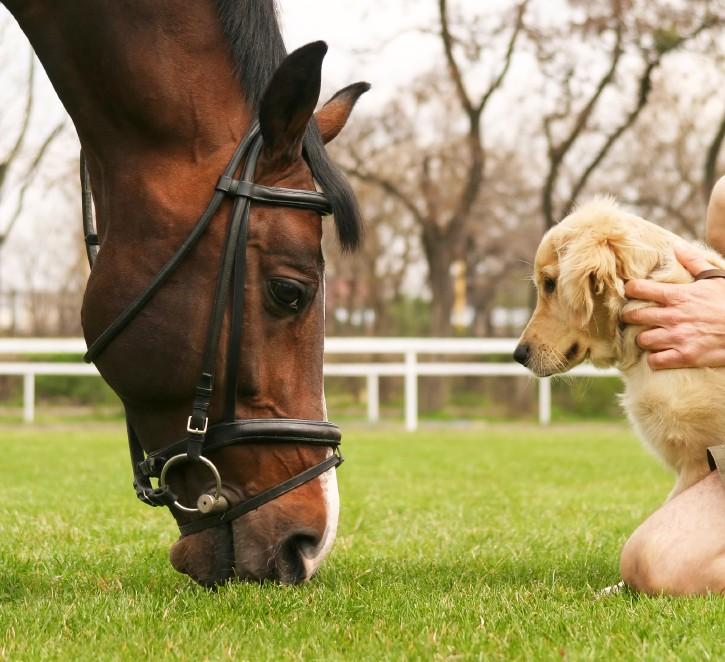Dog and Equestrian Relationships
It’s difficult to find a horse owner who doesn’t also live with at least one dog. Horses and dogs are a natural combination. If you love horses, chances are you love dogs, too.
Although dogs and horses can often become great friends, danger is inherent whenever these two species come together. The sheer size of a horse, combined with its nature as a prey animal, can mean trouble for even the mellowest dog. Likewise, dogs can pose a great danger to horses as well.
In order to keep your dog safe around horses, it’s important to remember that horses are often afraid of dogs, and will kick, bite or strike to defend themselves. A well-placed kick from a horse can cause severe injury or death.
Conversely, a dog can cause damage to a horse by biting it, chasing it or scaring it to the point where the horse injures itself trying to escape.
Before allowing your dog to be around horses, follow these precautions:
- Train your dog. Provide your dog with basic training so he will respect your authority when in the presence of a horse. Teach him that horses are not to be chased or barked at. This is especially important if the horse is being ridden.
- Use a leash. When your dog first meets a horse, keep him on leash so you can control his reaction. Do not allow him off leash until you are certain he will not harass the horse.
- Teach respect. If your dog has no fear of horses, teach him to stay away from the horse’s legs. Some dogs are so comfortable around horses; they can get underfoot and be stepped on. A healthy fear of horses is a good thing for a dog.
- Gauge the horse. Before allowing your dog to approach a horse, get a sense of the horse’s reaction to your dog. Determine if the horse seems undisturbed—head and neck are level with the rest of the body, the eye is calm, muscles relaxed—before allowing your dog anywhere near the horse. If the horse is tense, with his head raised and nostrils flaring, or is being ridden, keep your dog away.
- Watch for pack mentality. Your dog may ignore horses when he’s alone, but could become harassing when in the company of a more aggressive dog. If another dog is present, determine whether this dog might be a bad influence on your normally well-behaved canine.
- Discourage play. Horses and dogs sometimes like to play together, but this should be discouraged. Horses may find it fun to have a dog run alongside them when they are galloping through a field, but a playful kick from the horse can prove fatal to the dog. This behavior also encourages aggression on the part of the dog, and should not be permitted.
- Supervise your dog. Never take for granted that your dog is safe around horses. Always keep a close watch on him whenever a horse is nearby.
About the Author: Audrey Pavia is an award-winning freelance writer and author of “The Labrador Retriever Handbook.” She is a former staff editor of Dog Fancy, Dog World and The AKC Gazette magazines. To learn more about her work, visit www.audreypavia.com.





